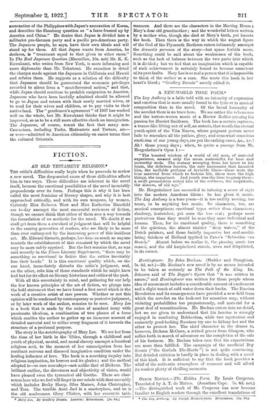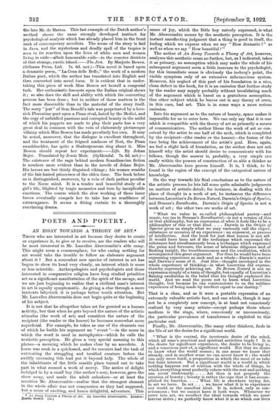OTHER Novzr.s.—The Hidden Force. By Louis Couperus. Translated by A.
T. de Mattes. (Jonathan Cape. 7s. fid. net.) The distinguished work of Mr. Couperus has now become familiar to English readers through the excellent translations of • The Lay Anthony, By Joseph Hemeshelmer. Heinemann. t2e. 04.1 the late Mr. de Mattos. This last example of the Dutch author's method shows the same strongly developed instinct for psychological analysis which has already placed him in the front rank of contemporary novelists. The scene of the story is laid in Java, and the mysterious and deadly spell of the tropics is seen in its reaction upon the lives of white men and women living in exile—albeit honourable exile—in the remoter districts of that strange, exotic island.—The Jest. By Marjorie Bowen. (Odhams Press, Ltd. 7s. 6d. net.)—This novel is based upon a dramatic poem, " La Cena delle Beffe," the work of a modern Italian poet, which the author has translated into English and then converted into novel form. It is evident that in under- taking this .piece of work Miss Bowen set herself a congenial task. Her enthusiastic forenote upon the Italian original shows it ; so also does the skill and ability with which the converting process has been done ; but in neither of these matters is the fact more discernible than in the material of the story itself. The sorry " jest" of Sem Benelli's tale was perpetrated by a love- Sick Florentine poet upon a Pisan rival, hated by the Medici, and the orgy of unbridled passions and corrupted beauty in the midst of which his puppets are made to play their parts has a very great deal in common with the vein of elaborately picturesque villainy which Miss Bowen has made peculiarly her own. It may be noted, moreover, that the dialogue is excellent throughout, and the treatment of the feigned madness of Neri, the Pisan swashbuckler, has quite a Shakespearean ring about it. Miss Bowen should repeat her experiment.—Life. By Johan Bojer. Translated by Jessie Muir. (Gyldendal. 7s. 6d. net.)— The existence of the saga behind modern Scandinavian fiction is nowhere more evident than in the novels of Johan Bojer. His heroes are but thinly disguised vikings ; his women wraiths of the fair-haired princesses of the olden time. The book before us is distinguished, moreover, by a vein of dark pathos peculiar to the Norse mind. It is a tender and beautiful study of a girl's life, blighted by tragic memories and torn by inexplicable emotions. The course which the slow working of these inner forces eventually compels her to take has no semblance of extravagance. It seems a fitting curtain to a thoroughly convincing drama.



































 Previous page
Previous page